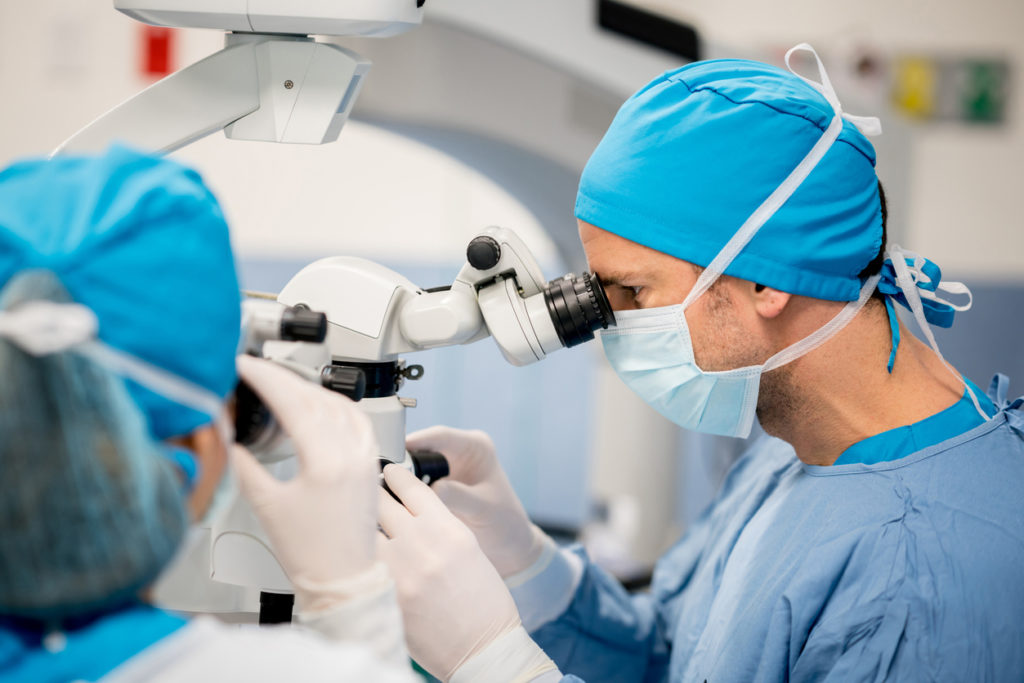MIDDLETOWN EYE CARE
CATARACT SURGERY IN LOUISVILLE, KY
CATARACT SURGERY WITH ADVANCED TECHNOLOGY INTRAOCULAR LENSES IN MIDDLETOWN KY
Being told that you have a cataract that will require surgery is frightening to many people. This is why our physicians and staff are ready to answer all of your questions about what a cataract is and how it is removed in order to make the experience a pleasant one. We will let you know everything that is going to happen before, during, and after the cataract surgery so that there won’t be any surprises. We always feel that a well-informed patient will always have a better experience than a patient that is uninformed about what to expect.
Our physicians provide laser-assisted cataract surgery with advanced technology intraocular lens implants and other treatment options at Middletown Eye Care for patients in Louisville, KY and surrounding areas.
BEFORE YOUR CATARACT SURGERY
 One of the most important parts of cataract surgery is the preoperative evaluation. During your exam, our physicians will do a thorough medical evaluation of the eye which will include dilation of the pupils. This is done in order to evaluate the severity of the cataract and to assess the eye for any other diseases which may be present, such as glaucoma or macular degeneration.
One of the most important parts of cataract surgery is the preoperative evaluation. During your exam, our physicians will do a thorough medical evaluation of the eye which will include dilation of the pupils. This is done in order to evaluate the severity of the cataract and to assess the eye for any other diseases which may be present, such as glaucoma or macular degeneration.
Once it has been determined that you require cataract surgery in order to improve your vision, you will be provided a detailed explanation of how the surgery is performed and the risks and benefits of the surgery. At this point, we will also discuss the newest technologies available to help restore near and far vision following cataract surgery. After this, an ophthalmic technician or our physicians will perform preoperative measurements on your eyes in order to help our physicians pick the correct intraocular lens for your eye. The technician will also schedule a date and time for your surgery and answer any final questions that you may have.
Our physicians and staff are available to discuss any questions that you may have prior to your surgery, so please contact us or call 502.245.0305 if you have any questions.
THE DAY OF CATARACT SURGERY


The surgery itself will take 10 to 20 minutes. During the surgery, Dr. Burns will give you simple instructions that are very easy to follow as you will be awake during the surgery. Some patients require more sedation during the surgery, and this will be determined by our physicians. Most patients do not experience any sensation during the surgery, but occasionally, some patients may experience a feeling of pressure on the eye. This only lasts for a few seconds.
When the surgery is completed, you will be taken to the recovery area and given instructions on how to care for the eye after surgery. The eye will be covered by a clear plastic shield for protection. The shield is usually removed about three hours after the surgery.
AFTER CATARACT SURGERY


CALL US with any questions: 502-245-0305
CATARACT SURGERY FAQS
WHAT IS A CATARACT?
A cataract is a clouding of the natural lens in the eye. A cataract affects vision when it becomes dense enough to either scatter light entering the eye or prevents the lens from properly focusing on images.
WHAT CAUSES CATARACTS?
Cataracts are caused by a number of factors, but the primary cause of most cataracts is aging. Other causes include trauma, previous eye surgery such as retinal detachment repair, radiation exposure, poorly controlled diabetes, certain medications such as steroids, and certain congenital conditions. Rarely, infants can be born with cataracts or they can form in the first few years of life which will necessitate removal early in life.
HOW CAN I PREVENT CATARACTS?
While there are no known medical treatments that are known to prevent or reverse the formation of cataracts, it is generally thought that a healthy lifestyle in regard to diet and exercise will help prevent the early onset of cataracts. It is well known that cigarette smoking is linked to premature cataract formation, so the avoidance of smoking is highly recommended. Protecting the eyes from intense sunlight has also been shown to slow down the progression of cataracts. Therefore, it is recommended that patients protect their eyes from the sun by using high quality sunglasses with 100% UVA and UVB protection.
WHAT ARE THE SYMPTOMS OF CATARACTS?
Cataracts typically cause problems with distance vision and night vision. Patients with significant cataracts have difficulty seeing objects at a distance, for example street signs, the scroll on the bottom of the television and following a golf ball. Night vision problems result from the scattering of light caused by the cataract; patients will often complain of difficulty driving at night due to glare in the form of starbursts and halos around headlights from oncoming traffic. Many patients will stop driving at night due to these glare symptoms. Cataracts usually do not cause problems with reading vision until they are very advanced.
HOW LONG DOES IT TAKE TO RECOVER FROM CATARACT SURGERY?
Most people are able to return to work and driving the day after the surgery. The main activities that need to be avoided for the first week include heavy lifting, swimming and any sports activity that has the risk of being struck in the eye.
IS CATARACT SURGERY PAINFUL?
Most patients do not have any discomfort during surgery. Some patients have a pressure sensation in the during certain points of the surgery but it is not typically reported as painful. The most common sensation after the surgery is the sensation that there is something in the eye like an eyelash or a grain of sand. That sensation usually is gone by the next day.
WHY AM I NOTICING VISION CHANGES AND GLARE AT NIGHT?
HOW LONG WILL MY SURGERY PRE OP APPOINTMENT IN YOUR OFFICE TAKE?
WHERE DOES DR. BURNS PERFORM CATARACT SURGERY?
HOW LONG WILL I BE AT THE SURGERY CENTER FOR CATARACT SURGERY?
HOW LONG DOES CATARACT SURGERY TAKE?
DO I HAVE TO UNDRESS FOR CATARACT SURGERY?
WILL INEED SOMEONE TO DRIVE ME WHEN I HAVE CATARACT SURGERY?
WHAT ARE THE DROPS THAT I USE FOR CATARACT SURGERY FOR?
IF I AM USING MORE THAN ONE KIND OF DROP; HOW LONG DO I NEED TO WAIR BETWEEN DROPS?
CAN I BEND OVER AND POICK UP SOMETHING AFTER I HAVE MY CATARACT SURGERY?
CAN I WASH MY HAIR AFTER CATARACT SURGERY?
HOW SOON CAN I DRIVE AFTER CATARACT SURGERY?
CAN I TAKE AN AIRLINE FLIGHT DURING THE FIRST WEEK FOLLOWING MY CATARACT SURGERY?
IF I NEED NEW GLASSES AFTER CATARACT SURGERY, WHEN WILL I GET THEM?
IS CATARACT SURGERY COVERED BY MY INSURANCE?
Middletown Eye Care proudly provides patients from Louisville, KY and the surrounding areas with Cataract Surgery. Contact us at (502) 245-0305 or fill out a Contact Form here.
ASK OUR DOCTORS
Schedule Your Appointment Today!
Middletown Eyecare
13324 Shelbyville Rd.
Middletown KY 40223
Call us: 502.245.0305
Fax: 502.254.1425
SERVICES
HOURS
Monday 8am-4:30pm
Tuesday 8am-4:30pm
Wednesday 8am-4:30pm
Thursday 8am-4:30pm
Friday 8am-12:30pm
Optical shop is by appointment only with the following hours:
Monday 8am-4:30pm
Tuesday 8am-4:30pm
Wednesday 8am-4:30pm
Thursday 8am-4:30pm
Friday 8am-12:30pm
Schedule Your Appointment Today!
13324 Shelbyville Rd.
Middletown KY 40223
Call us: 502.245.0305
Fax: 502.254.1425
HOURS
Monday 8am-4:30pm
Tuesday 8am-4:30pm
Wednesday 8am-4:30pm
Thursday 8am-4:30pm
Friday 8am-12:30pm
Optical shop is by appointment only with the following hours:
Monday 8am-4:30pm
Tuesday 8am-4:30pm
Wednesday 8am-4:30pm
Thursday 8am-4:30pm
Friday 8am-12:30pm

